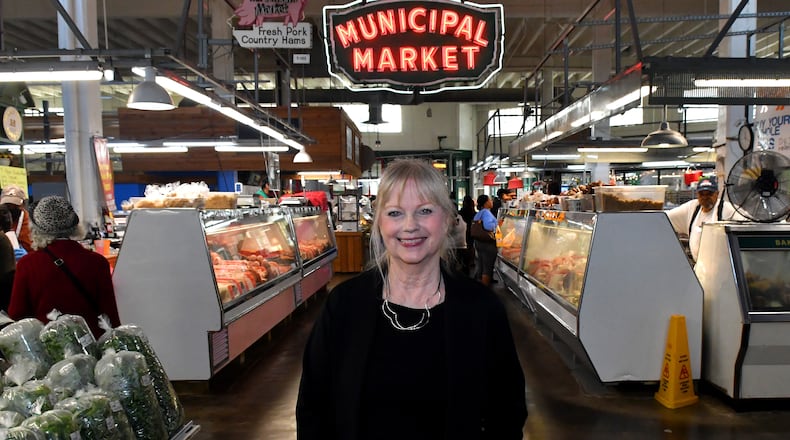Born in the aftermath of the devastating Great Atlanta Fire of 1917, and originally established as an outdoor farmers market in the Sweet Auburn neighborhood in 1918, Atlanta’s original food hall opened on May 1, 1924.
The Atlanta Women’s Club had launched a fundraiser to erect the sprawling brick and mortar building located along Edgewood Avenue. Designed by architect A. Ten Eyck Brown to be fireproof, it was named the Municipal Market of Atlanta.
Since then, it’s had its ups and downs. Now owned by the City of Atlanta and managed by a nonprofit board of directors, it appears to be enjoying a bit of a renaissance under the direction of market manager Pam Joiner, who was hired in 2005.
“One of my favorite things about the market is that it was founded by a group women, before they could even vote,” Joiner said during a recent tour. “They came up with the concept and in 1923 raised $300,000 to build it. It’s actually located in the geographic center of the City of Atlanta. They picked this spot because of that.”
Credit: Phil Skinner
Credit: Phil Skinner
Over the years, the market has been known by various names, which sometimes has caused confusion.
“The Municipal Market is the original name, and that’s the sign you see in the middle of the building,” Joiner pointed out. “It was known as the Sweet Auburn Curb Market from the 1990s to 2010. We’ve restored the building to as much of its original appearance as possible.”
A signature of the market is multiple purveyors selling produce, meat and seafood from long expanses of refrigerated glass cases. Restaurant stalls offer everything from tacos, wood-fired pizza and Cajun-Creole cuisine to Vietnamese banh-mi, Hawaiian poké and vegan soul food.
“Pre-COVID, our foot traffic averaged 2,500 to 3,000 people a day,” said Joiner, noting that it’s down 10% since the pandemic. “It’s mostly lunch-based. We get customers from Grady, Children’s Health Care, Georgia State and the local community. The saddest thing is that so many people don’t know the market is here.”
Despite that, and the COVID downturn, the market is fully occupied now with 29 vendors.
“That’s the first time since I’ve been here, and I’ve been here for 17 years, so I think that’s really good,” Joiner said. “We actually have a waiting list for restaurant spaces.”
In large part that’s due to the market’s reputation as a small business incubator. “It’s probably the most important thing we do,” Joiner declared.
Restaurants that got their start at the market include Grindhouse Killer Burgers, which opened in the market in 2009, followed by Bell Street Burritos and Sweet Auburn Barbecue. In 2012, Arepa Mia started out as a vendor before opening a second location in Decatur in 2014.
Grindhouse founder Alex Brounstein didn’t intend to open a restaurant, but as a lawyer, he thought he could help revitalize the market and make it more successful.
“I decided on burgers, because I knew it was something I could do,” Brounstein said. “And everybody likes burgers, so that’s how I came up with it. I thought I could help introduce people to the market and start to build a brand for myself. I didn’t have high expectations at the time, but obviously it worked out.”
Brounstein, who closed the Municipal Market Grindhouse location in 2020, has witnessed some changes among the food stalls, including the addition of more healthy vegetarian and vegan options.
“It’s a cool incubator for small businesses, and there are a lot people who want to get into that healthy category, so it’s a great place to start with a stall in the market,” he said. “It’s about diversity and showcasing immigrant cultures around Atlanta. Many of the meat and produce vendors now are Korean.”
Credit: CHRIS HUNT
Credit: CHRIS HUNT
Miss D’s New Orleans Style Pralines & Popcorn is another success story among the incubators.
“She started selling pralines at a table in late 2009, and now she has eight kiosks at Mercedes-Benz Stadium,” Joiner noted. “She’s one of our tenants that’s in the process of converting from retail to wholesale, so you’ll be able to buy her pralines and popcorn in different locations, like Zoo Atlanta.”
Asked to sum up the history and mission of the Municipal Market, Joiner thought for a moment, then said, “It really is all about food. It’s challenging sometimes, but it’s very heartwarming to watch people realize their dream. If you think about it, that’s part of the American dream — being able to own a small business, work for yourself and do what you want to do.”
Sign up for the AJC Food and Dining Newsletter
Read more stories like this by liking Atlanta Restaurant Scene on Facebook, following @ATLDiningNews on Twitter and @ajcdining on Instagram.
About the Author


